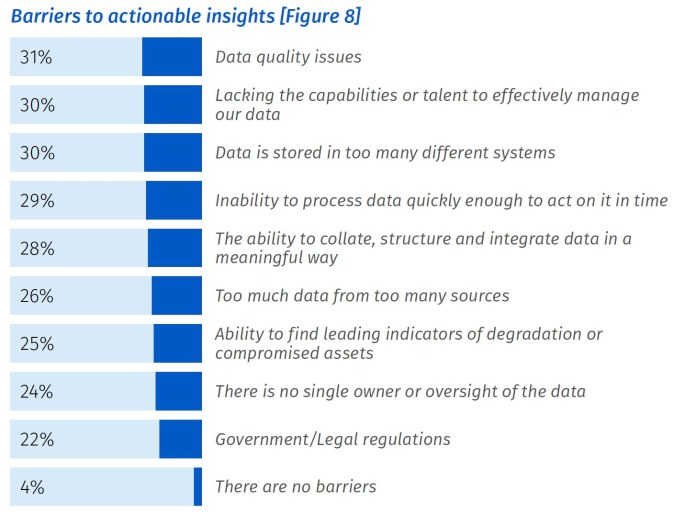Most companies are struggling to develop working artificial intelligence strategies, according to a new survey by cloud services provider Rackspace Technology. The survey, which includes 1,870 organizations in a variety of industries, including manufacturing, finance, retail, government, and healthcare, shows that only 20% of companies have mature AI/machine learning initiatives. The rest are still trying to figure out how to make it work.
There’s no questioning the promises of machine learning in nearly every sector. Lower costs, improved precision, better customer experience, and new features are some of the benefits of applying machine learning models to real-world applications. But machine learning is not a magic wand. And as many organizations and companies are learning, before you can apply the power of machine learning to your business and operations, you must overcome several barriers.
Three key challenges companies face when integrating AI technologies into their operations are in the areas of skills, data, and strategy, and Rackspace’s survey paints a clear picture of why most machine learning strategies fail.
Machine learning is about data
Machine learning models live on computing resources and data. Thanks to a variety of cloud computing platforms, access to the hardware needed to train and run AI models has become much more accessible and affordable.
But data continues to remain a major hurdle in different stages of planning and adopting an AI strategy. 34% of the respondents in the Rackspace survey stated poor data quality as the main reason for the failure of machine learning research and development, and another 31% said they lacked production-ready data.
[Read:Â ]
This highlights one of the main hurdles when applying machine learning techniques to real-world problems. While the AI research community has access to many public datasets for training and testing their latest machine learning technologies when it comes to applying those technologies to real applications, getting access to quality data is not easy. This is especially true in industrial, health, and government sectors, where data is often scarce or subject to strict regulations.
Data problems crop up again when machine learning initiatives move from the research to the production phase. Data quality remains the top barrier when it comes to using machine learning to extract valuable insights. Data engineering problems also pose a significant problem, such as data being siloed, lack of talent to connect disparate data sources, and not being fast enough to process data in a meaningful way.

Both startups and established companies suffer from data problems, though scale seems to be the key differentiator between the two, according to Jeff DeVerter, CTO of Rackspace Technology. “Startups tend to be constrained with not all the right resources to implement a quality data pipeline and consistently managing it over time,†DeVerter said to TechTalks in written comments. “Enterprises usually have scale on their side and with that comes the rigor that’s required.â€
The best way companies can prepare for the data challenges of AI strategies is to do a full evaluation of their data infrastructure. Eliminating silos should be a key priority in every machine learning initiative. Companies should also have the right procedures for cleaning their data to improve the accuracy and performance of their machine learning models.
AI talent is still in high demand
The second area of struggle for most companies is access to machine learning and data science talent. According to Rackspace’s survey, lack of in-house expertise was the second biggest driver of failure in machine learning R&D initiatives. Lack of skill and difficulty in hiring was also a key barrier in adopting AI technologies.

With machine learning and deep learning having reached mainstream use in production environments only recently, many smaller companies don’t have data scientists and machine learning engineers who can develop AI models.
And the average salary of data scientists and machine learning engineers matches those of experienced software engineers, which makes it difficult for many companies to put together a talented team that can lead its AI initiative.
While the shortage of machine learning and data science talent is well known, one thing that has gone mostly unnoticed is the need for more data engineers, the people who set up, maintain, and update databases, data warehouses, and data lakes. Per Rackspace’s figures, many initiatives fail because companies don’t have the talent to adapt their data infrastructure for machine learning purposes. Breaking down silos, migrating to cloud, setting up Hadoop clusters, and creating hybrid systems that can leverage the power of different platforms are some areas where companies are sorely lacking. And these shortcomings prevent them from making company-wide deployments of machine learning initiatives.
With the development of new machine learning and data science tools, the talent problem has become less intense. Google, Microsoft, and Amazon have launched platforms that make it easier to develop machine learning models. An example is Microsoft’s Azure Machine Learning service, which provides a visual interface with drag-and-drop components and makes it easier to create ML models without coding. Another example is Google’s AutoML, which automates the tedious process of hyperparameter tuning. While these tools are not a replacement for machine learning talent, they lower the barrier for people who want to enter the field and will enable many companies to reskill their tech talent for these growing fields.
“Lack of in-house data science talent is not the barrier it once was now that more of these services are able to use their own ML to help in this regard as well consulting firms having these talents on-staff,†DeVerter said.
Other developments in the field are the evolution of cloud storage and analysis platforms, which have considerably reduced the complexity of creating the seamless data infrastructures needed to create and run AI systems. An example is Google’s BigQuery, a cloud-based data warehouse that can run queries across vast amounts of data stored in various sources with minimal effort.
We’re also seeing growing compatibility and integration capabilities in machine learning tools, which will make it much easier for organizations to integrate ML tools into their existing software and data ecosystem.
Before entering an AI initiative, every organization must make a full evaluation of in-house talent, available tools, and integration possibilities. Knowing how much you can rely on your own engineers and how much it will cost you to hire talent will be a defining factor in the success or failure of your machine learning initiatives. Also, consider whether re-skilling is a possible course of action. If you can upskill your engineers to take on data science and machine learning projects, you will be better off in the long run.
Outsourcing AI talent
Another trend that has seen growth in recent years is the outsourcing of AI initiatives. Only 38% of the Rackspace survey respondents relied on in-house talent to develop AI applications. The rest were either fully outsourcing their AI projects or employing a combination of in-house and outsourced talent.

There are now several companies that specialize in developing and implementing AI strategies. An example is C3.ai, an AI solutions provider that specializes in several industries. C3.ai provides AI tools on top of existing cloud providers such as Amazon, Microsoft, and Google. The company also provides AI consultancy and expertise to take customers step by step through the strategizing and implementation phases.
According to the Rackspace report: “A mature provider can bring everything from strategy to implementation to maintenance and support over time. Strategy can sidestep the areas where AI and machine learning efforts may lose momentum or get lost in complexity. Hands-on experts can also spare organizations from the messy work of cleanup and maintenance. Such expertise, taken together, can make all the difference in finally achieving success.â€
It is worth noting, however, that fully turning over an organization’s AI strategy to outside providers can be a double-edged sword. A successful strategy requires close cooperation between AI specialists and subject matter experts from the company that is implementing the strategy.
“This is very similar to companies who move to a DevOps development methodology and attempt to outsource the entirety of the development. DevOps requires a close partnership between the developers, business analysts, and others in the business,†DeVerter said. “In the same way, AI projects require strategy and technical expertise—but also require a tight partnership with the business as well as leadership.â€
Outsourcing AI talent must be done meticulously. While it can speed up the process of developing and implementing an AI strategy, you must make sure that your experts are fully involved in the process. Ideally, you should be able to develop your own in-house team of data scientists and machine learning engineers as you work with outside experts.
How do you evaluate your AI strategy?
Finally, another area that is causing much pain for companies embarking on an AI journey is forecasting the outcome and value of AI strategies. Given the application of machine learning being new to many areas, it’s hard to know in advance how long an AI strategy will take to plan and implement and what the return on investment will be. This in turn makes it difficult for innovators in organizations to get others on board when it comes to garnering support for AI initiatives.
Of the respondents of the Rackspace survey, 18% believed that a lack of clear business case was the main barrier to adopting AI strategies. Lack of commitment from executives was also among the top barriers. Lack of use cases and commitment from senior management show up again among the top challenges in the machine learning journey.
“AI often wanders around as a solution looking for a problem within organizations. I believe this is one of the greatest impediments to its wide-scale adoption within organizations,†DeVerter said. “As AI practitioners can demonstrate practical examples of how AI can benefit their specific company—leadership will further fund those activities. Like any business venture—leadership needs to know how it will either help them save or make money.â€
Evaluating the outcome of AI initiatives is very difficult. According to the survey, the top-two key performance indicators (KPI) for measuring the success of AI initiatives were profit margins and revenue growth. Understandably, this focus on quick profits is partly due to the high costs of AI initiatives. According to the Rackspace survey, organizations spend a yearly average of $1.06 million on AI initiatives.
But while a good AI initiative should result in revenue growth and lower costs, in many cases, the long-term value of machine learning is the development of new use cases and products.
“Short-term financial gains can be myopic if they aren’t paired with a long-term strategy that can be funded by those short-term gains,†DeVerter said.
If you’re in charge of the AI initiative in your organization, make sure to clearly lay out the use cases, the costs, and the benefits of your AI strategy. Decision-makers should have a clear picture of what their company will be embarking on. They should understand the short-term benefits of investing in AI, but they should also know what they will gain in the long run.
This article was originally published by Ben Dickson on TechTalks, a publication that examines trends in technology, how they affect the way we live and do business, and the problems they solve. But we also discuss the evil side of technology, the darker implications of new tech and what we need to look out for. You can read the original article here.
Published March 4, 2021 — 14:24 UTC



